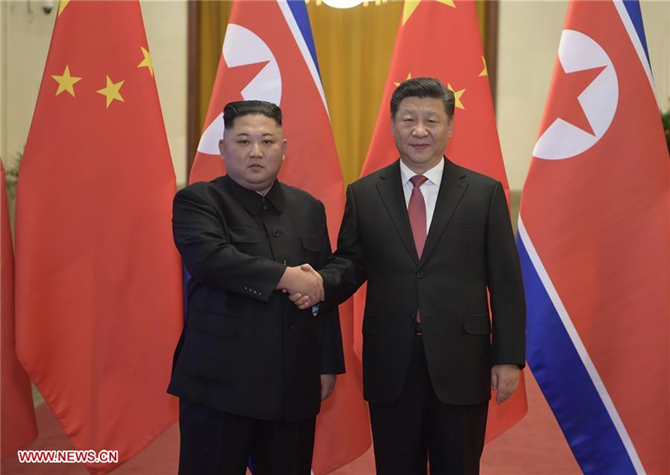Xi begins state visit to DPRK

President Xi Jinping holds a welcoming ceremony for Kim Jong-un, leader of the Democratic People's Republic of Korea, in Beijing, Jan 8, 2019. [Photo/Xinhua]
President Xi Jinping highlighted China's firm position on Wednesday to build close ties with the Democratic People's Republic of Korea, and reaffirmed Beijing's support for Pyongyang in striving for the political settlement of the Korean Peninsula nuclear issue.
Xi, also general secretary of the Communist of China Central Committee, made the comments in a signed article published by the DPRK's mainstream media including the Rodong Sinmun, an official newspaper of the Central Committee of the Workers' Party of Korea.
No matter how the international situation changes, the firm stand of the CPC and the Chinese government to consolidate and develop the friendship and cooperative relations with the DPRK remains unchanged, and will not change, Xi said in the article ahead of his two-day state visit to the neighboring country starting on Thursday at the invitation of DPRK top leader Kim Jong-un.
China will resolutely support Kim in leading the party and people of the DPRK in implementing a new national strategy and focusing more on economic growth and better livelihoods to secure greater accomplishments in the country's socialist construction, he said.
Speaking of the nuclear issue on the Korean Peninsula, Xi said both countries and their peoples underwent hardships and greatly appreciate the value of peace.
Thanks to Kim's decision-making as well as the joint efforts of relevant parties, Xi said, the overriding trend of the peninsula toward peace and dialogue has been in the making, and the political settlement of the issue has encountered a hard-won historical opportunity and has been universally acclaimed by the international community and also has met its expectations.
Advancing the political settlement process and safeguarding the peace and stability of the peninsula conforms to the development needs of both countries and the common interests of the two peoples, Xi said.
Saying Beijing supports dialogue to address Pyongyang's legitimate concerns, the president stated China stands ready to strengthen communication and coordination with the DPRK and other parties concerned and jointly push for progress in the consultations about the peninsula issue to make positive contributions to regional peace, stability and prosperity.
The visit comes as China and the DPRK embrace the 70th anniversary of their diplomatic ties this year.
Xi said that, at this historic moment, his visit to the DPRK aims to carry on the traditional friendship and usher in a new chapter of bilateral ties.
In reviewing the traditional friendship forged by the old generation of leaders from both countries, Xi said the long-lasting, profound relationship between the two peoples is more precious than gold.
Under the leadership of the two parties, people from both countries have trusted, supported and assisted each other whether they were jointly fighting against external invaders for national independence and liberation or during the course of the socialist revolution and construction, he added.
Xi said that China-DPRK relations, guided by Kim and himself, stand at a new starting point in history after 70 years of glorious development, renewing their vigor and vitality.
He urged the two nations to intensify strategic communication, carry on the fine tradition of high-level exchanges, deepen interparty interactions and mutual learning in state governance and expand pragmatic cooperation across the board.
Xi said he wants to use the visit to work along with Kim and other comrades from the DPRK to map out plans for bilateral cooperation, writing a new chapter in the traditional friendship between the two countries.
Xi added that he and Kim are confident about and capable of bringing bilateral ties to a stage of new development in the new era to deliver more benefits to the people from both countries and promote peace, stability and prosperity in the region and the world.
Editor: John Li